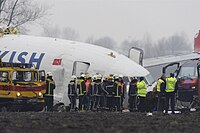Engine failure may have been factor in Amsterdam plane crash
Thursday, February 26, 2009

Image: Radio Nederland Wereldomroep.
According to the chief of the agency investigating the Turkish Airlines aeroplane crash at Amsterdam's Schiphol Airport in the Netherlands yesterday, engine trouble may have been a factor in the accident.
Addressing Dutch state television, chairman of the Dutch Safety Board Pieter van Vollenhoven said that the way the aircraft dropped from the air suggests that the engines may have failed. "If you then lose speed, you then literally fall out of the sky," he said. However, he noted that the reason for the apparent engine failure had not yet been established.
Van Vollenhoven said that the analysis of the aeroplane's flight data recorders could be finished as early as Tuesday, but added that the Dutch Safety Board would most likely not disclose any preliminary findings until next week.

Image: Radio Nederland Wereldomroep.
Fred Sanders, a spokesman for the board, said that the damage to the aircraft corroborated witness accounts that the plane impacted with the ground tail-down.
"This may indicate that the plane had lost its forward momentum, that there was no motor function," he said, adding that it may be be a long time before a full explanation of the accident is available. "We will have an official finding probably in about a year, but we should be able to give an interim finding within weeks," he said.
Nine people were killed and 86 injured on Wednesday when a Boeing 737-800 with 135 people on board registered to Turkish Airlines crashed just short of the runway in a farmer's field near Schiphol Airport.
Related news
- "Airplane crashes at Schiphol Airport; 9 killed" — Wikinews, February 25, 2009
Sources
- "Engine failure clue in jet crash" — BBC News Online, February 26, 2009
- "Engine trouble may have caused Netherlands crash" — Associated Press, February 26, 2009
- Lizzy Davies. "Amsterdam plane crash investigators search wreckage for clues to disaster" — February 26, 2009
- "Nationaliteit doden vliegtuigongeluk bekend" — NU.nl, February 26, 2009 (Dutch)
